Out of the Spotlight
Mike Lachance enjoys retirement on his own terms
Hall of Fame driver Mike Lachance has an interesting way of summarizing his time on earth, which is now being spent in blissful retirement.
After a 50-minute conversation in which he reflected on all things past and present, Lachance surmised that, “I always say, if I ever fell out of an airplane, I would land in someone’s backyard and they would have a trampoline there that would break my fall. That’s the kind of luck I’ve had in my life.”
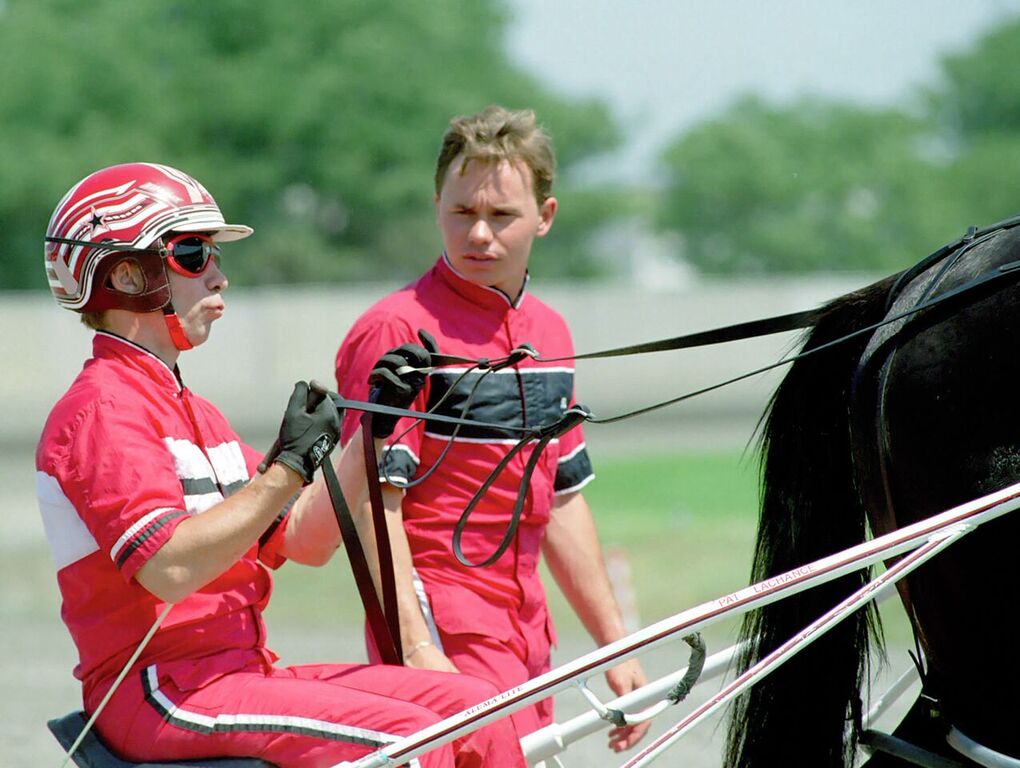 Like Father, Like Sons: In retirement, Mike Lachance now helps his son, trainer-driver Pat Lachance (right), condition horses in New Jersey. Lachance’s other son, Martin, trains horses in Toronto, and Lachance owns horses with both sons. Photo: Mark Hall
Like Father, Like Sons: In retirement, Mike Lachance now helps his son, trainer-driver Pat Lachance (right), condition horses in New Jersey. Lachance’s other son, Martin, trains horses in Toronto, and Lachance owns horses with both sons. Photo: Mark Hall
Lachance spoke while reclining on a chair in a small office that he and son Pat share at Magical Acres Training Center in Chesterfield, N.J. Father and son had just come in from a morning of training 2-year-olds under cloudy central New Jersey skies, and Mike absent-mindedly played with the zipper of his red-and-black training outfit as he spoke.
He said he has gained 10 pounds since retirement, but looks lean and in superior shape as he still runs on the treadmill at least three times a week and carries his 160 lbs. well. The 66-year-old is a picture of contentment; a man at ease away from the spotlight.
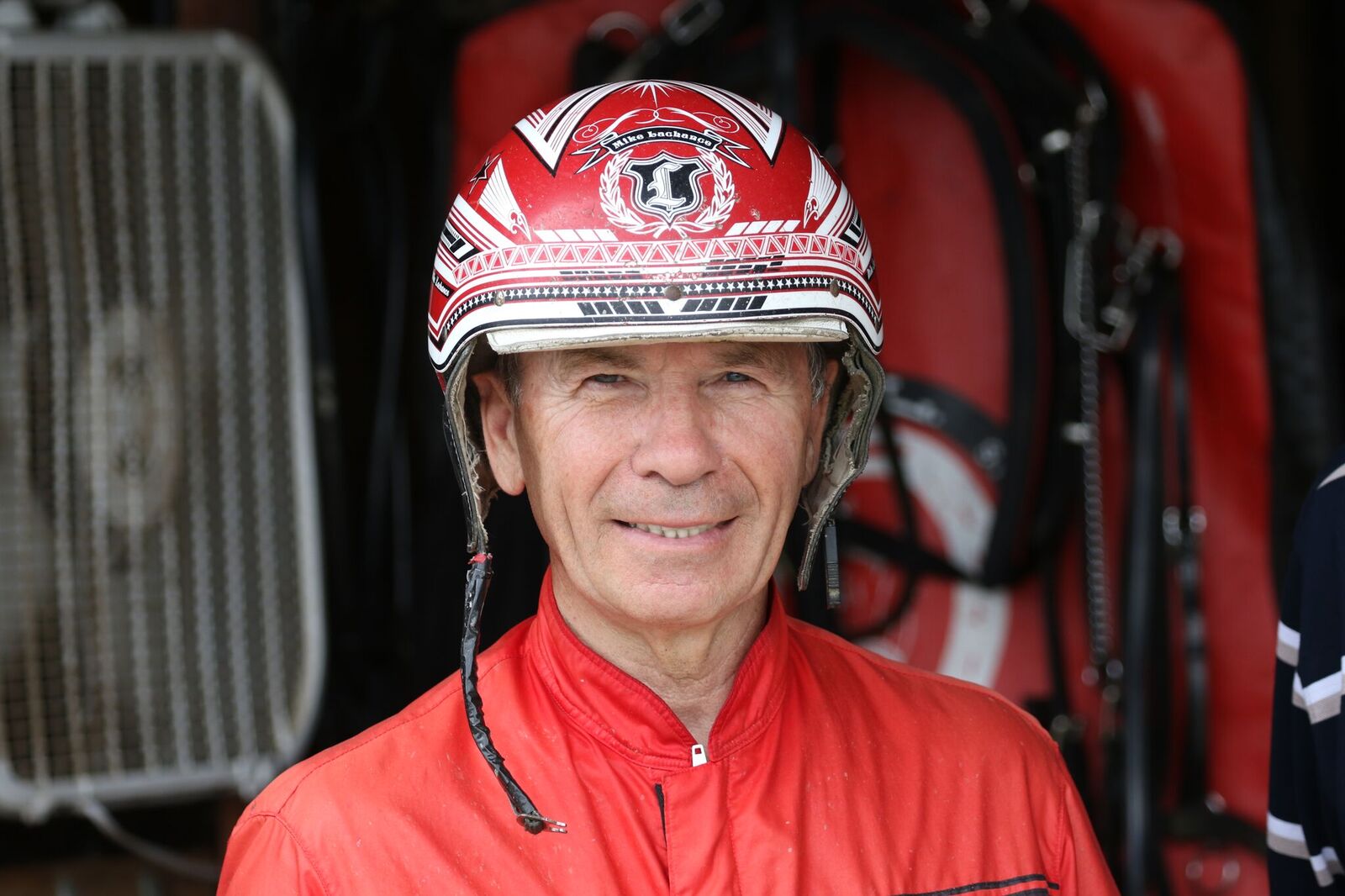
At 66, Lachance still works out regularly and splits his retirement activities between working around his house, spending time with family, and conditioning horses. Photo: Mark Hall
And what a bright light it was. Lachance amassed $190,785,997 in purse earnings and still ranks fourth among all drivers in history in the category. His 10,422 wins are No. 10 in history in North America and include plenty of big ones.
But he knew when it was enough.
On Oct. 4, 2014, Lachance drove 20-1 longshot Propulsion to victory at Lexington’s Red Mile for trainer Tony Alagna. Upon emptying his locker in the driver’s room, he got in the car, turned to his wife, Micheline, and said, “That’s my last drive.”
And it was, except for a drive in the Legends Day Trot at Canada’s Clinton Raceway in September 2015.
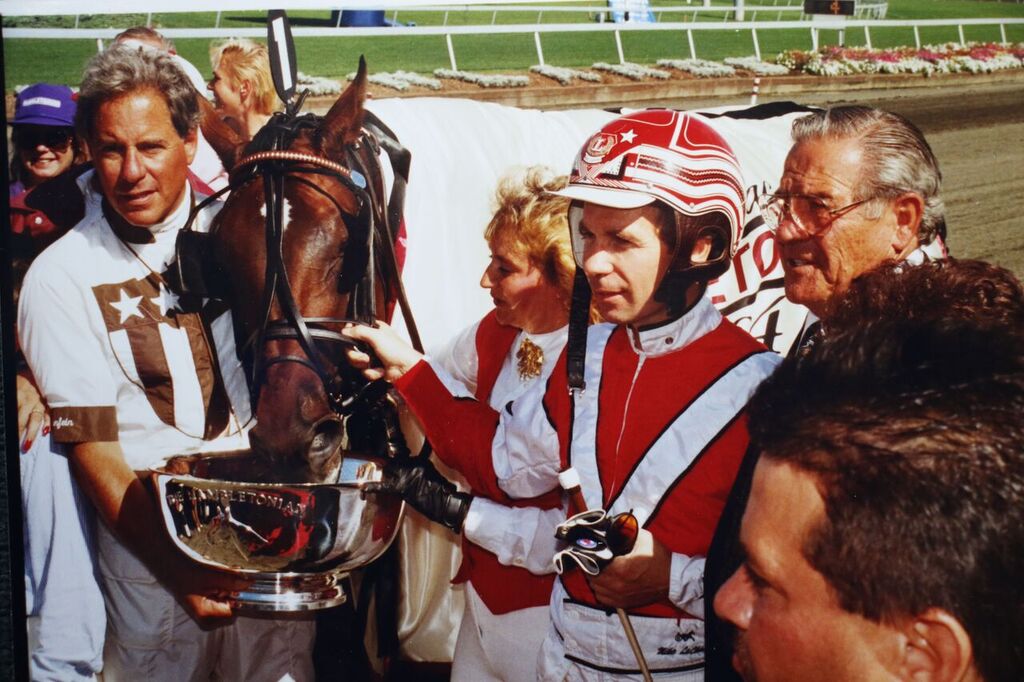
Lachance and trainer Ron Gurfein won the Hambletonian in 1994 with Victory Dream, the first of three Hambo wins for the formidable duo in the ’90s. Photo: Ed Keys
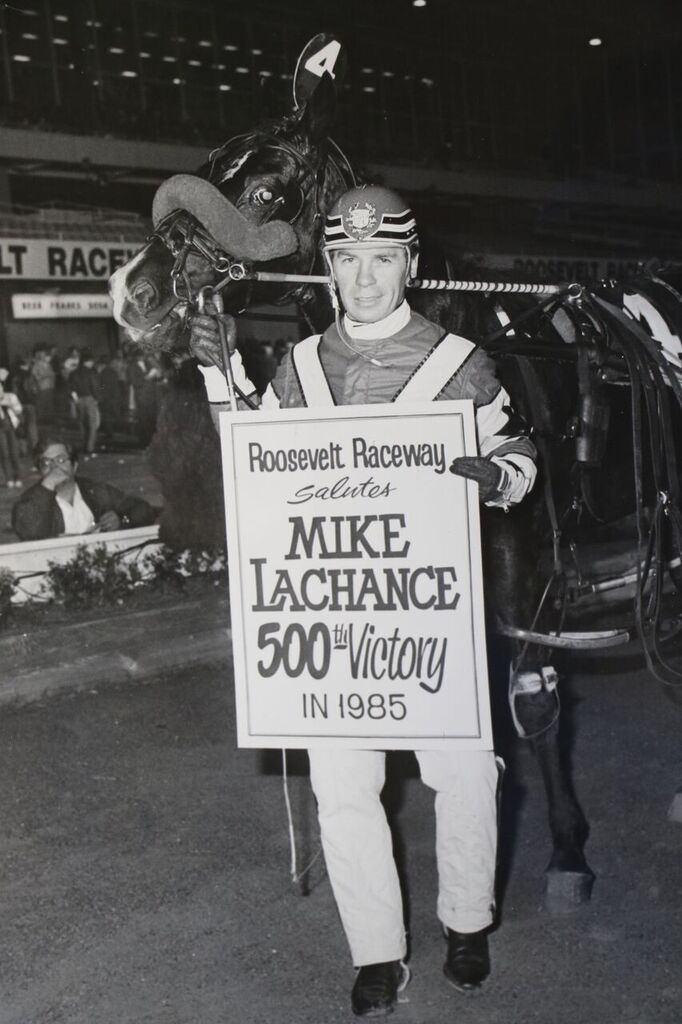
After driving in both Canada and the U.S. throughout the ’70s, Lachance moved to the U.S. permanently in 1982 , and by 1985 was beginning to make a name for himself. Photo: USTA files
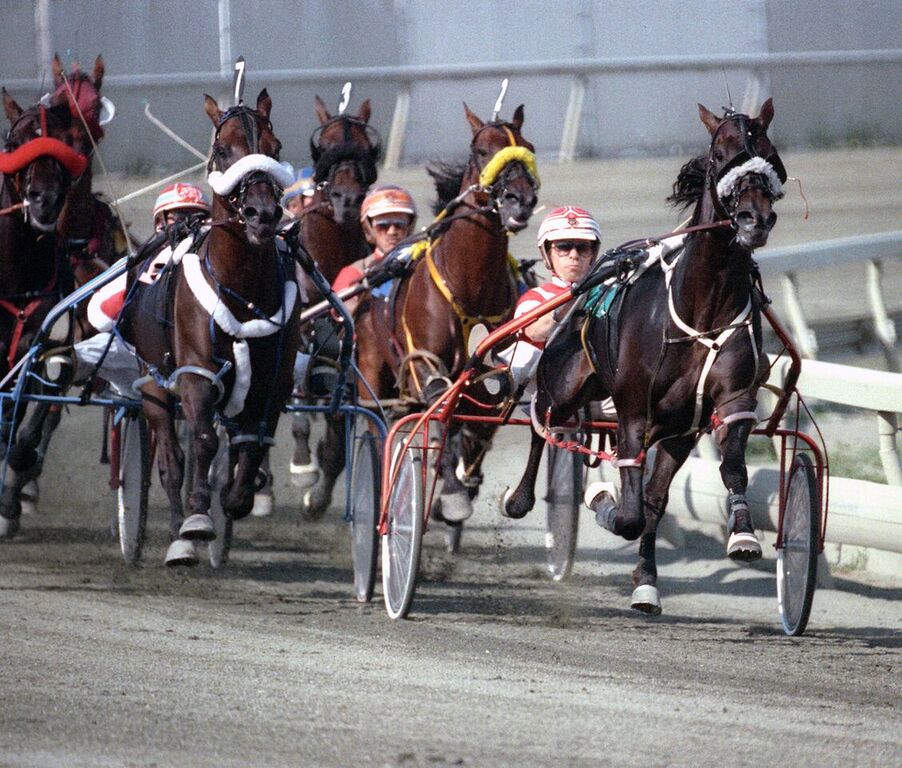
Lachance credits Matt’s Scooter with changing his life. The two are shown here winning the 1989 U.S. Pacing Championship at the Meadowlands, but it was their victory in the 1988 Meadowlands Pace that gave Lachance his first $1 million race win. Photo: Dean A. Hoffman
Some folks wondered what Mike would do after an entire life devoted to driving horses. As a man defined by winning races, where would he get his rush? How would he survive?
Just fine, actually. Better than fine, in fact.
“It’s like a dream,” he said. “I’ve got the best of everything. I’ve got two sons in the business. For me that’s good. I can keep my mind sharp. I own horses with both of them.”
Martin trains horses in Toronto while Pat is carving out an impressive training and driving career in the U.S. Watching Pat and Mike talk following a training session, one is left to imagine the vast wealth of knowledge being exchanged.
“It’s been a lot of fun,” Pat said. “We spend more time together. I can pick his brain. We bounce ideas off each other.”
“I really enjoy it,” Mike said. “But we are not always on the same page. He’s got younger ideas. Sometimes he’s right; sometimes he’s wrong.”
When informed of that statement, Pat broke into a sly grin.
“Did you record that?” he said. “I’d like to hear that I’m right sometimes.”
Sharing in Pat’s happiness is his mother, Micheline, Lachance’s wife of 43 years. She was never big on harness racing, and sat in the stands knitting while Mike won race after race. When he asked her how many he won afterward, Micheline would say “Uh, well, I know you had a good night.”
Lachance gives her all the credit for making their marriage work.
“You’ve got to be lucky to have a very good wife, and that was my luck,” he said. “She’s a great, great, great mother and grandmother and she is a great wife. My wife always took care of herself, was always a pretty woman right from the start. She’s still attractive at 68. I was on the road all the time. Believe me, I’m very lucky we stayed together and that’s more credit to her. I was always bouncing around.”
The son of a Canadian cattle farmer, Lachance’s dad was “a very giving man, and my mom was strong on discipline. I took a little from both of them.”
Lachance said he didn’t have a lot of education, but “I was smart about people. I could see someone (unreliable) coming a mile away.”
Starting in the sport at age 13, a mature Mike easily mixed with horsemen 10 years his senior. He considers himself fortunate “that I never got involved with drugs and drinking. It was always the horses.”
“At a young age, older people kind of liked me,” he said. “They knew I was talented, so I always had a friend to give me a hand – ‘You drive my horse, you do this, you do that.’ I was friendly with a lot of people and they helped me a lot.”
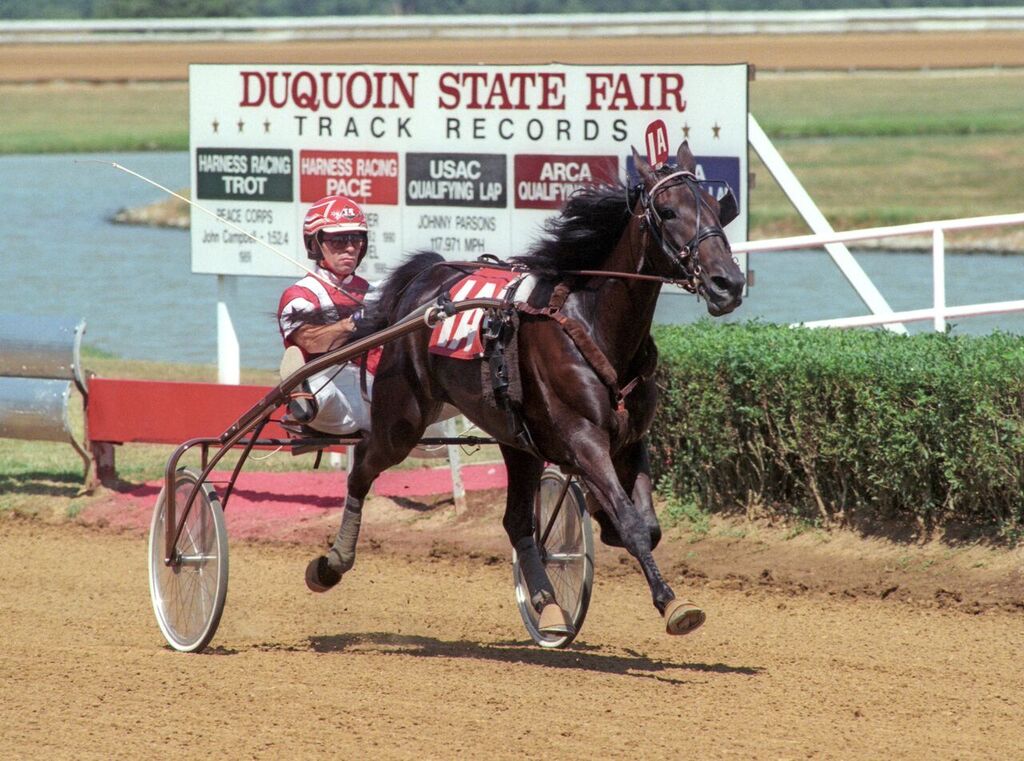
Lachance lists the Gurfein-trained world champion Continentalvictory as his favorite trotter. Photo: USTA Files
Lachance’s first trip to America was in 1966, training horses in Chicago with his brother, Gilles, at age 15. He partnered with Gilles on a $2,500 claimer and chose the horse himself.
“I got the OK from my brother,” Mike said. “He said ‘Yeah, it’s not bad.’ When you do that at age 15, it stays with you, builds confidence.”
A year later, he drove the entire summer in Batavia, N.Y., by breaking the rules. Born in December, he was 17 throughout the season without anyone knowing. In November, he was summoned by the judge’s office and informed he had to be 18. Lachance shrugged and simply said “I didn’t know.”
His eyes danced mischievously while recalling the incident, still proud he beat the system. He got 19 wins and earned $24,007 that year. It was 1968. A career was underway and a legend was being built.
From 1974 through 1981, Lachance earned between $528,000 and $982,000 every year. He then earned $1,881,384 in 1982, when he moved to the U.S. permanently, and $3,189,984 in ’83. Although his career had been a steady climb, the driver felt his turning point came in 1985.
Up to that point he had won some stakes races in Montreal, but nothing major. Then came a night at Yonkers, when he drove Laughs to victory in the $600,000 L.B. Sheppard Memorial.
“It just created a monster,” he said. “Back then I said I woke him up. He was a great horse at the time; he fit me perfect and it built my confidence after that.”
Two years later he won 770 races, breaking Herve Filion’s seasonal mark by 133. It was the third of four straight years the Canadian would lead all North American drivers in wins. In 1988, he drove Matt’s Scooter to victory in the Meadowlands Pace, which was his first $1 million race win. Lachance has credited that horse for changing his life. From 1997 through 2001 Lachance won more than $9 million every year, with a high-water mark of $10,700,483 in 2001.
One of Lachance’s big breaks came when he met future Hall of Fame trainer Ron Gurfein through Gilles. The pair won three Hambletonians: with Victory Dream in 1994, the filly Continentalvictory in 1996, and Self Possessed in 1999.
The trainer knew he had the right man in the bike.
“When he got behind the gate, he had ice water in his veins,” said Gurfein, still training in Florida. “Nothing fazes him. I’ve seen him in positions that would be horrifying. Watch the start of the Hambletonian with Self Possessed. He had a million and one decisions to make and made every one. They did everything they could to screw him, but it didn’t work.
“I could spot him out of 100 drivers all sitting behind a horse. It’s just the way he had. He’s very little (5-foot-6) and very strong. I really think he could instill fear in a horse that other guys didn’t do. I don’t mean in a bad way, like beat the crap out of him. He just had electric hands and could tell the horse to perform for him.”
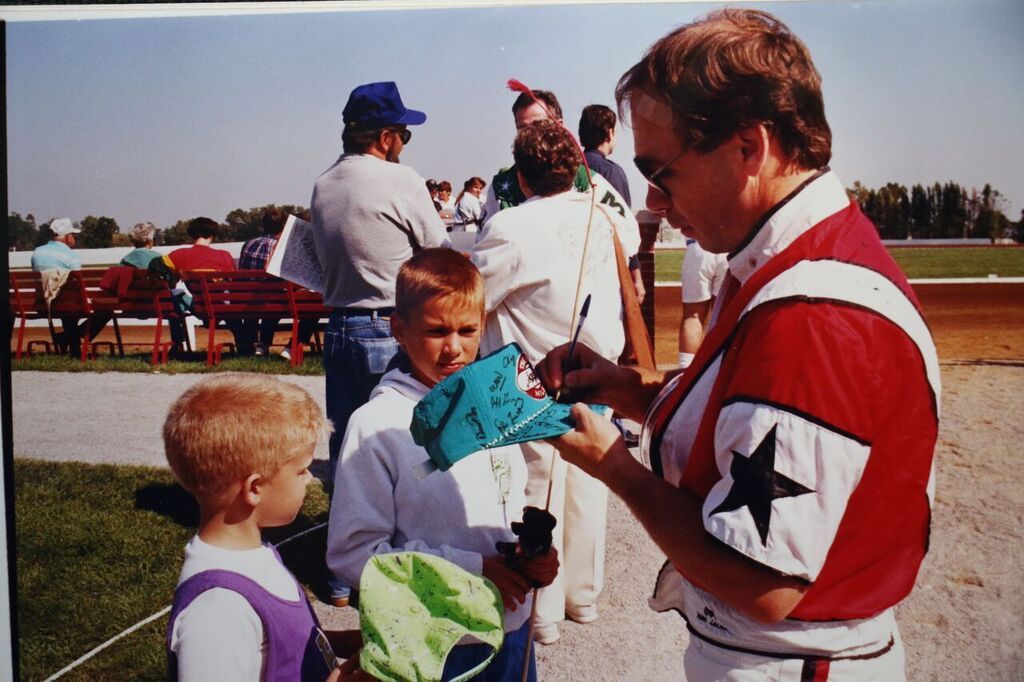
Lachance always had time for his fans, as shown here in this moment from Red Mile. Photo: USTA Files
Lachance felt the biggest keys to his success were confidence.
“I always felt I was just a little better than the next guy,” he said, “and the fact that “I wasn’t scared of anything, but I was very careful. If I saw something was going to happen, I’d let the guy in because he’s going to get in anyway. I had a sense for that. I’d rather they say ‘He was scared so he let me in,’ than say ‘He went down; he’s in the hospital.’”
Lachance suffered a few minor injuries during his driving career, but nothing major. He downshifted his career in 2007, giving up winter racing for the final eight years. It was his way of weaning himself off his “drug” as he began repaying Micheline for her patience by spending more time with the wife.
He walked away with four Hambletonian victories (he won his last with Amigo Hall for trainer Blair Burgess in 2003), five Little Brown Jugs, three North America Cups and 27 Breeders Crowns. In 1997, he won the Pacing Triple Crown with Western Dreamer. The list goes on and on. He lists his favorite trotter as Continentalvictory, and threw out names of pacers like Matt’s Scooter, Bettor’s Delight, Four Starzzz Shark and Western Ideal, among others.
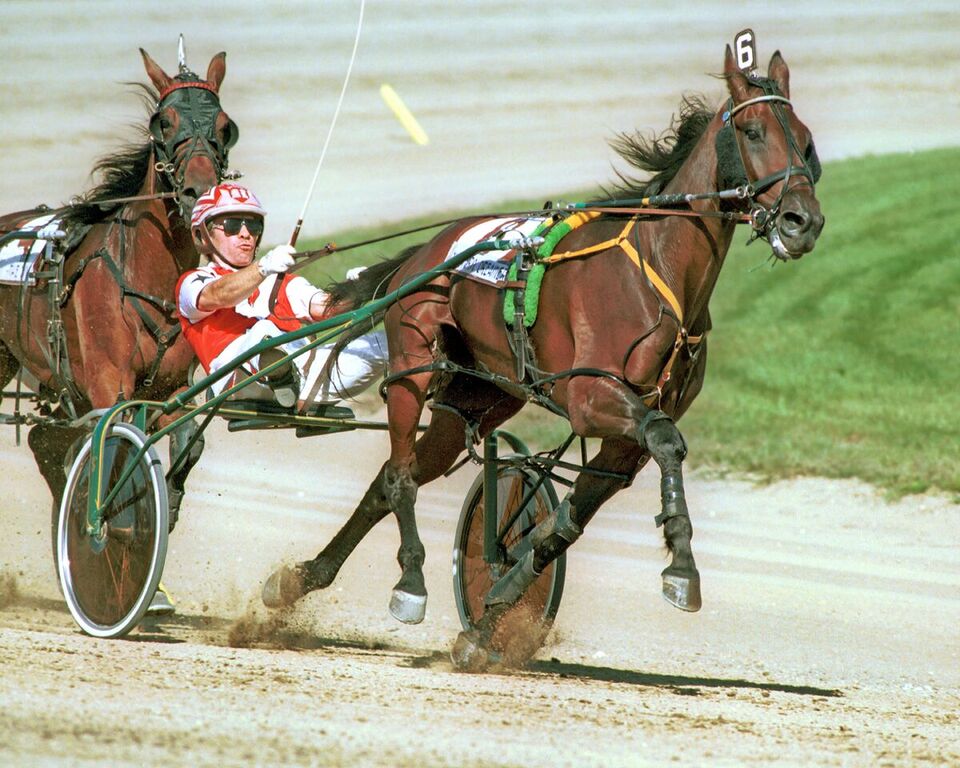
Continuing to add on to his long list of driving accomplishments, Lachance won the Pacing Triple Crown with Western Dreamer in 1997. Photo: Ed Keys
Driving them was like a dream.
And then it ended. On his terms.
“I didn’t want to be on the track if I wasn’t on top of my game,” he said. “I’ve seen so many great drivers–they stop three, five, 10 years too late. I promised myself in my mid-40s that when I’m starting to slow down a little bit, I want to stop before they run me over. Any athlete who tells you at 55, 60, ‘I’m just as good as I was,’ he’s lying to you and to himself. You lose it. Your reflexes aren’t as good. You get tired a little earlier.”
So, he called it quits and has never looked back.
Announcer Sam McKee, who passed away in March, wanted to have a retirement night for Lachance at the Meadowlands, but Lachance declined.
“I don’t like that stuff,” he said. “I don’t know if it’s modesty. I just don’t like it.”
Living a serene life with Micheline in their Millstone, N.J., home, Lachance “forces myself to stay in bed until 6 a.m.” then makes the short trip to Magical Acres to help Pat every morning. He stays until around noon, or whenever the work is done.
“It’s just been a lot of fun,” Pat said. “We spend more time together. There’s a lot of new training techniques that the younger generation uses. On the other hand, there’s old techniques that still work also. You put them together for different types of horses and we make it work that way.
“This is challenging at times. We butt heads like everybody else. At the end of the day we just get along really good. It’s a privilege.”
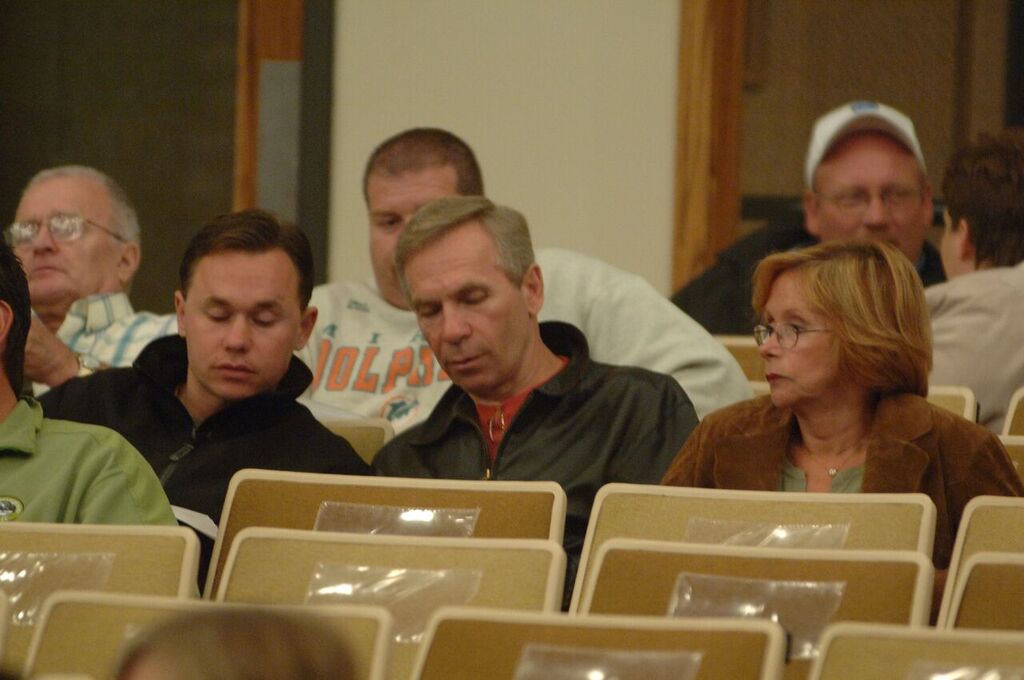
Micheline, Lachance’s wife of 43 years, was never big on harness racing, but steadfastly supported her husband through out his busy career, and is shown here with him and Pat at the 2006 Lexington Selected Yearling Sale. Photo: Mark Hall
Lachance watches every race in which Pat or Martin have a horse competing, be it live on his computer or the following morning when he awakens. He has yet to go to a track since retiring and still has not seen the new Meadowlands grandstand. But he’s not forgotten.
“I can’t go to the track and not have a person ask me ‘How’s your dad?’” Pat said. “No question, there’s still a lot of respect there.”
But Lachance doesn’t want to be fussed over. He wants to enjoy his wife, as the two go out for breakfast and dinner together, putter around the house, play with the grandchildren and just enjoy each other’s company. Mike doesn’t have hobbies, per se, but is constantly active.
“I love to take care of my house,” he said. “I’m a handyman–you better believe it. I love to take care of the gardening with my wife. I mow my lawn. I have a nice sitting mower. I get up, come here all morning, get lunch, go back home, do this, do that. Go to the bank, ba beep, ba boop. And at 5 o’clock I watch the news and will watch it up to 9 if I can. I have to accomplish something every day. It’s a sickness with me. For me to lie around and do nothing, it’s a bad day.”
He noted that after not drinking a dozen beers the first 50 years of his life, he will now enjoy a cold ale or glass of wine on occasion, but never more than one.
“The guy has the best work ethic and the most unbelievable self-control of any person I’ve ever met,” Gurfein said. “He changed my life. He got me to exercise, sleep right, eat the right foods. Everything to keep your mind alert.”
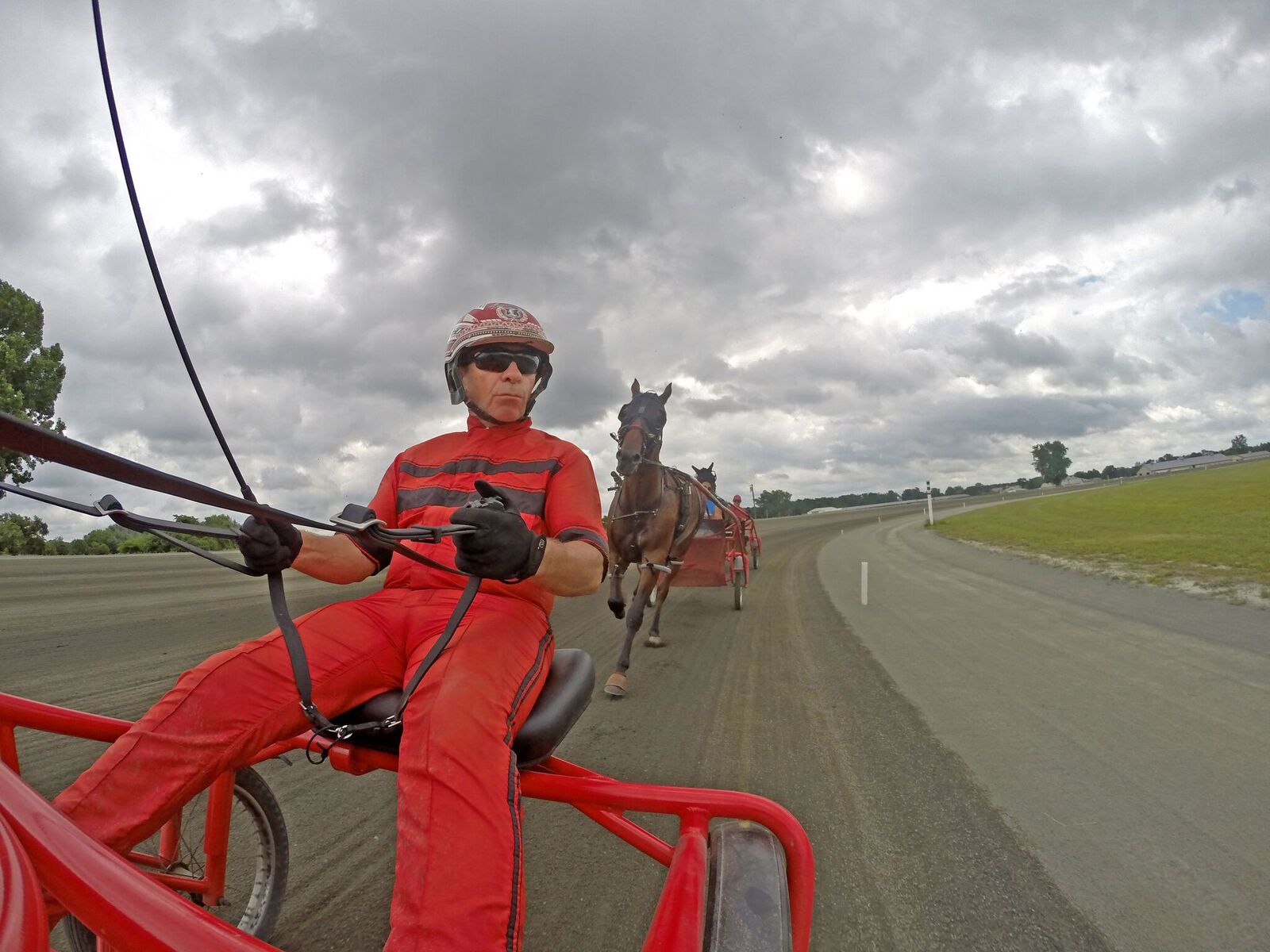
Lachance now spends his mornings helping Pat work with their horses at Magical Acres Training Center in Chesterfield, N.J. Photo: Mark Hall
Interestingly, with all the great moments Gurfein and Lachance had on the track, the trainer counts his best memories with Mike occurring in the car.
“Every year we would drive out west to Springfield and the Red Mile, and I’d take my whole barn with me, including Mike,” Gurfein said. “We’d go on these trips to Toronto and listening to him for four hours in the car made the drive seem like 25 minutes. The stories from childhood, the way he grew up in Quebec. It would make a fascinating novel. I’d write it if I thought there was any money in it.”
Asked if he prided himself on spinning a yarn, Lachance laughed and said his stories are just facts that bear repeating.
“I’m not a storyteller,” he said. “I don’t exaggerate when I tell things. There’s just a lot of things that have happened to me in my life. I was just very lucky.”
Story by Rich Fisher
To see more from the August issue of Hoof Beats, click here.

